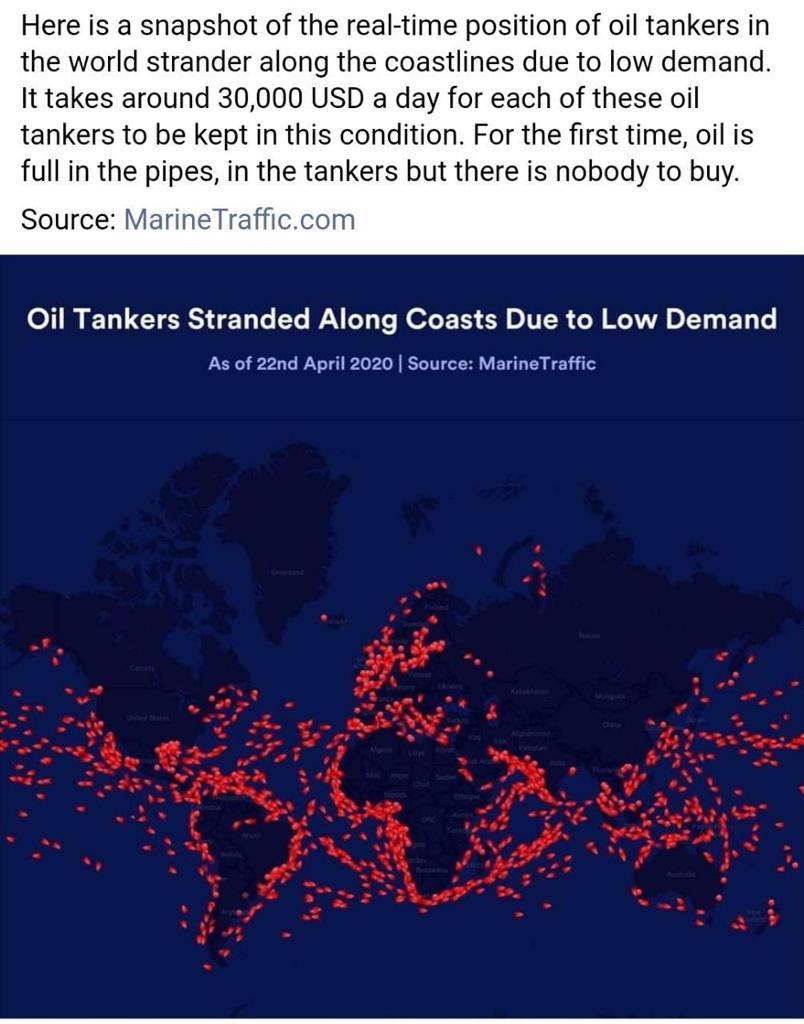The lock-downs across the globe have one common motive — Slow down the pace of spread of Covid-19 to manageable levels till a lasting cure and preventive vaccine for the virus is found. Even as some success is seen in this direction, the global economy is slipping into a recession. Every day we get expert opinions on the media about how widespread and depressing will the recession be and how long it would take for a recovery. Frankly, no one seems to have a handle on this.
Suddenly caught in he spiral of recession is the oil industry, which a little earlier itself was facing a downward trend thanks to the enhanced production by OPEC to spite Russia and bring down oil prices. The global lock-downs have further heightened the problems for the oil industry — by ensuring steep fall in demand. Almost all airlines round the world have grounded the larger part of their fleets. automobiles, the world over are off the roads in a big way, manufacturing units are shutdown, so the value of oil, the Black Gold is almost next to nothing now– Brent crude at around US $ 20 per barrel………….. but there appears to be a small window of hope i.e. the price of oil Futures is higher, an indication to traders and users that prices will improve in a few months. Sounds good but this brings in its wake a whole set of problems not only for the oil industry but Marine underwriters as well.
The immediate problem faced by the oil industry is finding storage places for all the oil produced and waiting for prices to improve. Production is being gradually reduced but cannot be stopped altogether. All the storage facilities in every country is overflowing, oil already shipped in oil tankers across the globe are unable to discharge the cargo as ports are either shut due to Covid-19, the storage tanks are full, pipelines are full, refineries too cannot take any additional stock……… so there is a problem of plenty ……a problem of what to do with the oil being produced.

The red dots in the above picture from Marine Traffic.com represents the position of crude carriers all across the globe.This is the oil which had been shipped and is awaiting discharge. Now oil tankers including VLCCs ( Very Large Crude Carriers) are being used as ‘ Floating storage’. Literally oil floats on water! The vessel owners and charterers are happy at the moment as the hire charges per day has suddenly shot up in the region of US $ 150,000. It is estimated that as on date the total quantity of oil in floating storage is around 160 million barrels and the number of VLCCs/ULCCs could be around 100. Even at the depressed price of US$ 20 per barrel, the value of oil in floating storage will be a mind-boggling amount.
The vessel owners/ charterers may have to navigate many issues. One, if the vessel remains stationary for long in one place, there could be marine growth ( hull fouling) needing increased maintenance and the question of who will bear these costs could come up. Legal issues in the form of remaining static in a country’s territorial waters could also invite unwanted attention as regards duties, taxation and even the security & pollution perspective.
If the issue is viewed from a marine cargo underwriter’s standpoint, the following points would stand out:
- If a simple cargo policy is purchased for the cargo on ICC terms or under Institute Bulk Oil clauses, the basic question will be ‘ is this floating storage’ in the ordinary course of transit’? Most certainly not. The storage is intentional, so the cover under the policy should cease immediately after loading on to the vessel or if a destination is stated but the direction is to remain static, then on receipt of this instruction from the assured. As Bill of Lading would be issued, the loading risk from shore/refinery tanks via pipelines to the vessel will be covered.
- Whether this should be considered as intentional storage and based on merits of each case, cover during storage should be given or not? If yes on what rates, terms & conditions and most importantly for how long?
- Exposure certainly gets enhanced, in terms of perils of nature, piracy ( static crude carriers could be sitting-ducks) in pirate-infested areas.
- The huge accumulations, as seen in the diagram above could be a major concern from the War perspective. Any war-like activity could have major repercussions especially in areas where there is political tension in the air.
- Even if intentional storage cover is extended on additional premium and specific terms, the risk of Terrorism will remain uncovered on account of the Termination of Transit clause ( Terrorism). Assureds will have to find separate insurers for the Terrorism bit, something which may not be easy.
- Last but not the least, under the current situation of coronavirus threat and the attendant precautionary measures taken everywhere, should some key personnel on board these floating storages catch the virus and have to be quarantined and if there is no way of substituting them, then the operation of the vessel in itself would become far more riskier.
Hope for better times ahead for the oil industry, insurance industry, shipping industry and the world at large!
Discover more from BalasBroadcast
Subscribe to get the latest posts sent to your email.
Excellent and timely article. I too get the Whatsapp picture but never believed it could be true till you posted it today.
Excellent and timely article. I too got the Whatsapp picture but never believed it could be true till you posted it today.
Pingback: Storage extension for liquid cargo – Bala's Broadcast